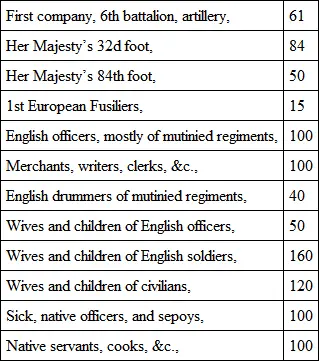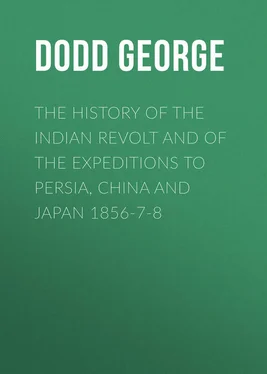George Dodd - The History of the Indian Revolt and of the Expeditions to Persia, China and Japan 1856-7-8
Здесь есть возможность читать онлайн «George Dodd - The History of the Indian Revolt and of the Expeditions to Persia, China and Japan 1856-7-8» — ознакомительный отрывок электронной книги совершенно бесплатно, а после прочтения отрывка купить полную версию. В некоторых случаях можно слушать аудио, скачать через торрент в формате fb2 и присутствует краткое содержание. Жанр: foreign_antique, foreign_prose, на английском языке. Описание произведения, (предисловие) а так же отзывы посетителей доступны на портале библиотеки ЛибКат.
- Название:The History of the Indian Revolt and of the Expeditions to Persia, China and Japan 1856-7-8
- Автор:
- Жанр:
- Год:неизвестен
- ISBN:нет данных
- Рейтинг книги:3 / 5. Голосов: 1
-
Избранное:Добавить в избранное
- Отзывы:
-
Ваша оценка:
- 60
- 1
- 2
- 3
- 4
- 5
The History of the Indian Revolt and of the Expeditions to Persia, China and Japan 1856-7-8: краткое содержание, описание и аннотация
Предлагаем к чтению аннотацию, описание, краткое содержание или предисловие (зависит от того, что написал сам автор книги «The History of the Indian Revolt and of the Expeditions to Persia, China and Japan 1856-7-8»). Если вы не нашли необходимую информацию о книге — напишите в комментариях, мы постараемся отыскать её.
The History of the Indian Revolt and of the Expeditions to Persia, China and Japan 1856-7-8 — читать онлайн ознакомительный отрывок
Ниже представлен текст книги, разбитый по страницам. Система сохранения места последней прочитанной страницы, позволяет с удобством читать онлайн бесплатно книгу «The History of the Indian Revolt and of the Expeditions to Persia, China and Japan 1856-7-8», без необходимости каждый раз заново искать на чём Вы остановились. Поставьте закладку, и сможете в любой момент перейти на страницу, на которой закончили чтение.
Интервал:
Закладка:
Конец ознакомительного фрагмента.
Текст предоставлен ООО «ЛитРес».
Прочитайте эту книгу целиком, купив полную легальную версию на ЛитРес.
Безопасно оплатить книгу можно банковской картой Visa, MasterCard, Maestro, со счета мобильного телефона, с платежного терминала, в салоне МТС или Связной, через PayPal, WebMoney, Яндекс.Деньги, QIWI Кошелек, бонусными картами или другим удобным Вам способом.
1
The visitor to the British Museum, in one of the saloons of the Ethnological department, will find a very remarkable series of figures, modelled by a native Hindoo, of the individuals forming a gang of Thugs; all in their proper costumes, and all as they are (or were) usually engaged in the successive processes of entrapping, strangling, and burying a traveller, and then dividing the booty.
2
A young native princess was sent to England from this district to be educated as a Christian lady; and Queen Victoria became a sponsor for her at a baptismal ceremony.
3
Our Anglo-Indian Army.
4
Leitch Ritchie. British World in the East.
5
Edinburgh Review , No. 216.
6
When General Nott returned to India after his victorious campaign in Afghanistan in 1842, he brought away with him the gates of Somnauth, which, according to the tradition, had remained at Ghiznee since the days of Mahmoud. This and other trophies gave occasion to an address from Lord Ellenborough to the native princes of India, conceived in somewhat bombastic language, in which the recapture of the gates was characterised as an achievement ‘avenging the insult of eight hundred years.’ The chiefs and princes of Sirhind, Rajwarra, Malwah, and Gujarat, were enjoined to transmit, ‘with all honour,’ the gates to Somnauth. The address was much ridiculed in England; but those on the spot believed it to be calculated to make an impression on the natives. The home government, however, would not permit the gates – even if the genuine sandal-wood originals, which is not free from doubt – to be sent to the still-existing temple of Somnauth; they considered such an act would identify the Company injuriously with one of the two great parties of religionists in India, and deeply offend the other.
7
Quarterly Review , No. 204.
8
Rightly did the governor-general, when officially informed of this achievement, speak of ‘the noble and cool soldiership of the gallant defenders’ of the magazine: ‘The governor-general in council desires to offer his cordial thanks to Lieutenants Raynor and Forrest, and the other survivors among the brave men mentioned in this report, and to express the admiration with which he regards the daring and heroic conduct of Lieutenant G. D. Willoughby and the warrant and non-commissioned officers by whom he was supported on that occasion. Their names are Lieutenants Raynor and Forrest, Conductors Shaw, Buckley, Scully, Sub-conductor Crow, Sergeants Edwards and Stewart. The family of the late Conductor Scully, who so devotedly sacrificed himself in the explosion of the magazine, will be liberally provided for, should it be ascertained that they have survived him.’
9
By Mr Knighton, author of Forest Life in Ceylon .
10
Lacs or lakhs of rupees: a lac being 100,000, value about £10,000.
11
The word telegram , denoting a message sent, as distinguished from the telegraph which sends it, has been a subject of much discussion among Greek scholars, concerning the validity of the grammatical basis on which it is formed; but as the new term is convenient for its brevity and expressiveness, and as it has been much used by the governor-general and the various officers connected with India, it will occasionally be employed in this work.
12
The initials N. I., B. N. I., M. N. I., &c., are frequently used in official documents as abbreviations of ‘Native Infantry,’ ‘Bengal Native Infantry,’ ‘Madras Native Infantry,’ &c.
13
Viscount Canning, in a letter written on the 7th of June to Lieutenant do Kantzow, said: ‘I have read the account of your conduct with an admiration and respect I cannot adequately describe. Young in years, and at the outset of your career, you have given to your brother-soldiers a noble example of courage, patience, good judgment, and temper, from which many may profit. I beg you to believe that it will never be forgotten by me. I write this at once, that there may be no delay in making known to you that your conduct has not been overlooked. You will, of course, receive a more formal acknowledgment, through the military department of the government, of your admirable service.’
14
Irving: Theory and Practice of Caste .
15
Report of Select Committee of House of Commons, 1832.
16
The number of persons in the intrenchment on that day will probably never be accurately known; but Mr Shepherd, from the best materials available to him, made the following estimate:

17
‘Mamma died, July 12.’ ‘Alice died, July 9.’ ‘George died, June 27.’ ‘Entered the barracks, May 21.’ ‘Cavalry left, June 5.’ ‘First shot fired, June 6.’ ‘Uncle Willy died, June 18.’ ‘Aunt Lilly, June 17.’
18
The following is an extract of a letter written by Major Macdonald, after the attack upon him and his brother-officers: ‘Two days after, my native officer said he had found out the murderers, and that they were three men of my own regiment. I had them in irons in a crack, held a drumhead court-martial, convicted, and sentenced them to be hanged the next morning. I took on my own shoulders the responsibility of hanging them first, and asking leave to do so afterwards. That day was an awful one of suspense and anxiety. One of the prisoners was of very high caste and influence, and this man I determined to treat with the greatest ignominy, by getting the lowest caste man to hang him. To tell you the truth, I never for a moment expected to leave the hanging scene alive; but I was determined to do my duty, and well knew the effect that pluck and decision had on the natives. The regiment was drawn out; wounded cruelly as I was, I had to see everything done myself, even to the adjusting of the ropes, and saw them looped to run easy. Two of the culprits were paralysed with fear and astonishment, never dreaming that I should dare to hang them without an order from government. The third said he would not be hanged, and called on the Prophet and on his comrades to rescue him. This was an awful moment; an instant’s hesitation on my part, and probably I should have had a dozen of balls through me; so I seized a pistol, clapped it to the man’s ear, and said, with a look there was no mistake about: “Another word out of your mouth, and your brains shall be scattered on the ground.” He trembled, and held his tongue. The elephant came up, he was put on his back, the rope adjusted, the elephant moved, and he was left dangling. I then had the others up, and off in the same way. And after some time, when I had dismissed the men of the regiment to their lines, and still found my head on my shoulders, I really could scarcely believe it.’
Читать дальшеИнтервал:
Закладка:
Похожие книги на «The History of the Indian Revolt and of the Expeditions to Persia, China and Japan 1856-7-8»
Представляем Вашему вниманию похожие книги на «The History of the Indian Revolt and of the Expeditions to Persia, China and Japan 1856-7-8» списком для выбора. Мы отобрали схожую по названию и смыслу литературу в надежде предоставить читателям больше вариантов отыскать новые, интересные, ещё непрочитанные произведения.
Обсуждение, отзывы о книге «The History of the Indian Revolt and of the Expeditions to Persia, China and Japan 1856-7-8» и просто собственные мнения читателей. Оставьте ваши комментарии, напишите, что Вы думаете о произведении, его смысле или главных героях. Укажите что конкретно понравилось, а что нет, и почему Вы так считаете.












